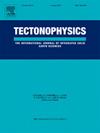Assessment of uncertainty propagation within compaction-based exhumation studies using Bayesian inference
IF 2.6
3区 地球科学
Q2 GEOCHEMISTRY & GEOPHYSICS
引用次数: 0
Abstract
Exhumation plays a crucial role in shaping the evolution and distribution of resource systems in sedimentary basins, affecting mineral and energy resource exploration. Accurate exhumation estimates, derived primarily from empirical equations based on compaction and thermal datasets, are essential but are often compromised by data errors and unquantified uncertainties in model parameters. For instance, model parameters are usually assumed not to be affected by uncertainties despite varying within measurable ranges. Uncertainties from such variation can propagate and compromise the accuracy of exhumation estimates.
This study introduces a novel and refined approach to exhumation estimation using Markov Chain Monte Carlo (MCMC) methods to quantify and address uncertainties in data and model parameters. Using this approach, we developed a workflow for quantifying exhumation magnitudes and their associated uncertainties and applied it to sonic log datasets from the Canning and Bonaparte Basins. The impact of uncertainty propagation on exhumation results was assessed by examining four scenarios: assuming no uncertainty in the model or data, considering data noise without model uncertainty, considering model uncertainty without data noise, and considering model uncertainties and data noise together.
Our study yielded robust exhumation estimates in the Canning and Bonaparte Basins. Comparison with previous studies shows similarities and differences in exhumation estimates for multiple episodes, with discrepancies potentially arising from variations in exhumation models, data quality and coverage. Uncertainty propagation analysis reveals that considering data-related and model uncertainties together produces variable distributions of exhumation estimates with wider uncertainty ranges. Overall, data quality and coverage proved more critical for the accuracy and precision of exhumation estimates than model refinement. Our models can be integrated into basin evolution studies, help refine fluid migration models, and improve understanding of sedimentation and ore preservation to optimise resource exploration in sedimentary basins.
利用贝叶斯推理评估基于压实的挖掘研究中的不确定性传播
挖掘对沉积盆地资源系统的演化和分布具有重要影响,影响着矿产和能源资源的勘探。准确的挖掘估计是必不可少的,主要来自基于压实和热数据集的经验方程,但往往受到数据误差和模型参数中未量化的不确定性的影响。例如,尽管模型参数在可测量的范围内变化,但通常假定不受不确定性的影响。这种变化带来的不确定性会传播并损害挖掘估计的准确性。本研究介绍了一种新颖而精细的挖掘估计方法,使用马尔可夫链蒙特卡罗(MCMC)方法来量化和处理数据和模型参数中的不确定性。利用这种方法,我们开发了一套量化挖掘震级及其相关不确定性的工作流程,并将其应用于Canning和Bonaparte盆地的声波测井数据集。通过假设模型或数据不存在不确定性、考虑数据噪声而不考虑模型不确定性、考虑模型不确定性而不考虑数据噪声以及同时考虑模型不确定性和数据噪声四种情况来评估不确定性传播对挖掘结果的影响。我们的研究在坎宁和波拿巴盆地得出了可靠的挖掘估计。与以往研究的比较表明,对多次事件的挖掘估计有相似之处,也有差异,差异可能是由于挖掘模型、数据质量和覆盖范围的差异造成的。不确定性传播分析表明,同时考虑数据相关不确定性和模型不确定性会产生具有更大不确定性范围的挖掘估算变量分布。总的来说,数据质量和覆盖范围证明对挖掘估计的准确性和精度比模型改进更为关键。我们的模型可以整合到盆地演化研究中,帮助完善流体运移模型,提高对沉积和矿石保存的认识,从而优化沉积盆地的资源勘探。
本文章由计算机程序翻译,如有差异,请以英文原文为准。
求助全文
约1分钟内获得全文
求助全文
来源期刊

Tectonophysics
地学-地球化学与地球物理
CiteScore
4.90
自引率
6.90%
发文量
300
审稿时长
6 months
期刊介绍:
The prime focus of Tectonophysics will be high-impact original research and reviews in the fields of kinematics, structure, composition, and dynamics of the solid arth at all scales. Tectonophysics particularly encourages submission of papers based on the integration of a multitude of geophysical, geological, geochemical, geodynamic, and geotectonic methods
 求助内容:
求助内容: 应助结果提醒方式:
应助结果提醒方式:


